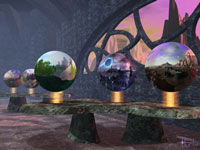 I must admit I basically let my worlds grow around my characters to fit their needs and give them only enough thought to make everything I'm adding work together and make sense.
I must admit I basically let my worlds grow around my characters to fit their needs and give them only enough thought to make everything I'm adding work together and make sense.Steven Savage had a bi-weekly column (perhaps at Seventh Sanctum, at least that's where they're archived) on world building. He suggests that though the characters are the main characters the world is the most important "character". It's the lens the story is seen through.
Even if you're like me and the characters drive the story, taking a break in the middle of the story to flesh out the world and fill in some details could bring in fresh ideas.
Here's a bit from his first column:
WHY WORLDBUILD
I always advise some solid world-building before beginning an original-setting story in detail. Why do this? This may seem an obvious question with an obvious answer, but I've found that's not always the case, even for myself.
Good reasons to worldbuild in detail before you start writing:
- It prevents error. Let's face it - its easy to start running with an idea then forget you need to know where it takes place. However, when you're in the middle of a really good story and you suddenly realize you're not sure where the Dark Overlord's power comes from, and your best idea conflicts with chapter 2's moving occult sequence.
Quite simply, good worldbuilding makes writing a great deal easier. You have an idea of why and how things work, and its less likely you'll come up with a continuity-breaking concept (and when you do, hopefully its in the design phase so you can get it out of your system).- Provide ideas. A well-designed world takes on a life of its own. In my experiences, a world, just like and as a character, can start writing itself. One idea leads to another, one question leads to an answer that begs another question, and soon the world is running itself.
- A bulwark against contrivance and accidental plagiarism. When your world is developed, uniquely yours and alive, it prevents those moments where you want to contrive something or worry where an idea came from. Even if some ideas in your world don't seem original, a well-build worlt helps ensure a unique and believable handling of such ideas.
- Stops favoritism. When your world's continuity is primary, its harder to play favorites with a character and thus avoid leaps of logic and contriving. When you know there's no way to stop a deadly plague in your story except technology the heroes don't have, you have to think of a good way for them to deal with - or write some believable death scenes.
Essays about world building by Steven Savage are archived as Chronological and By Subject (links to all but 6 articles, perhaps some didn't fall into a clear category).
No comments:
Post a Comment